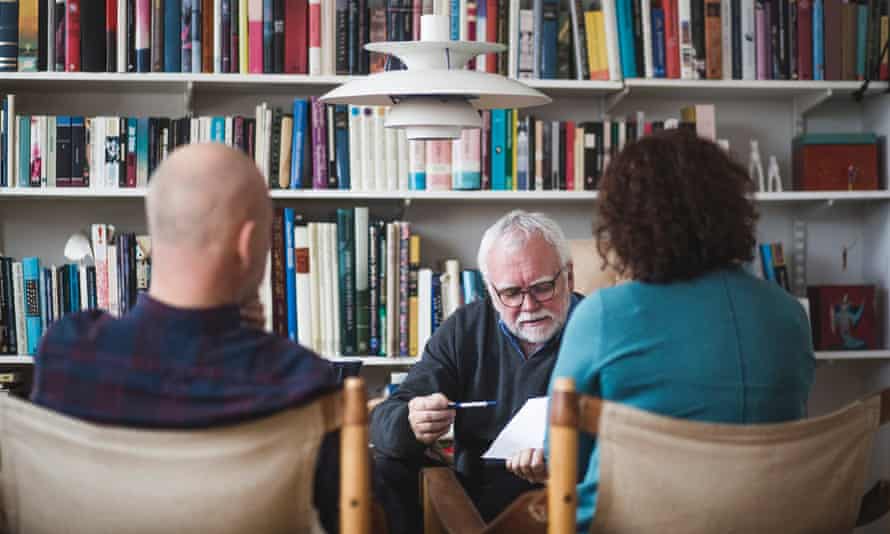'People will forgive you for being wrong, but they will never forgive you for being right - especially if events prove you right while proving them wrong.' Thomas Sowell
Search This Blog
Friday, 12 July 2024
Tuesday, 2 July 2024
Wednesday, 19 June 2024
Saturday, 23 December 2023
Thursday, 30 November 2023
Friday, 9 June 2023
Never go to bed on an argument … and 19 other relationship ‘rules’ unpicked by experts
TRUE “For most people, a satisfying sexual relationship is an important part of a good relationship,” says Susanna Abse, psychoanalytic therapist and author of Tell Me the Truth About Love: 13 Tales from Couple Therapy. “While sex may not be the most important thing, it’s certainly an indicator of chemistry, and it matters – especially at the start. Also, if you’re having bad sex with someone in the beginning, why would you want to carry on?”
FALSE This is one of those saccharine myths we’ve been sold by romantic fairytales. However close you are to someone, says Joanna Harrison, divorce lawyer-turned-couples-therapist and author of Five Arguments All Couples (Need to) Have, you’ll never be able to second-guess them on everything. “And why would you want to? That would be boring. Also, people change; we’re all evolving.” What matters is that you each share what you’re feeling, you listen to one another, and you try to see things from your partner’s point of view.
FALSE There are many kinds of affair, and this, says Abse, is key. “An affair can be an exit strategy, sure. But it can also be a protest – a way of bringing your partner’s attention to something that isn’t working for you in the relationship. If it’s that kind of affair, and you can work through why it happened with your partner, you can move on from it – providing apologies are given, reparations are made and forgiveness is forthcoming.”
If you’re having bad sex with someone in the beginning, why would you want to carry on?
FALSE The important thing isn’t whether you share a bed – it’s talking about why if you don’t, says Harrison. “Whether it’s down to snoring or young kids, sleeping in separate beds reduces the intimate time you get together. So you need to discuss how you can compensate.” Make love on the sofa in the evening when the kids have gone to sleep. If snoring has driven you to separate rooms, at least have your morning tea in bed together.
FALSE So often, says Terrence Real, family therapist and author of Us: Getting Past You and Me to Build a More Loving Relationship, rows happen because one or both partners have been drinking, or they’re not feeling good, or it’s late and you’re both tired. “What I say is: you’re not going to resolve anything tonight. Go to bed, and the next morning have a cup of tea together and talk it through.” All relationships are about the cycle of closeness, disruption and return to closeness. “Our culture worships the harmony phase, but a good relationship thrives on surviving the mess. The work of intimacy is the collision of imperfections, and how we manage those.”
TRUE You can be playful with someone, says Real, “but if you look into their eyes, there’s a difference between the shades being down – ‘shop closed’ – and the signal ‘come hither’. And if you’re using the sexual energy between you and someone else to feel excited, that’s like a mini-affair.” The rule is this, says Real: if your partner could hear you, and the way you’re speaking would upset them, it’s not OK.
FALSE. “I’m in the personality transplant business,” says Real. “Therapy is about understanding why we behave as we do, and making conscious decisions to change things in order to hang on to someone we care about.” Relate therapist Simone Bose, who runs her own practice, agrees that people can change, but they have to want to, and that means confronting aspects of themselves that might be uncomfortable or painful. “What’s hardest is overcoming the defensive mechanism you have as default,” she says.

TRUE If an argument escalates to violence or one partner feeling unsafe, that’s wrong, and you need expert help. But as you learn the landscape of your partner, says Harrison, arguments show you’re working each other out. “You’re finding out what your partner is passionate about, and sharing that. So these disagreements are full of useful information about what matters to each of you. If couples stop talking about what they care about, and sometimes arguing about it, they can start to feel disconnected.”
FALSE “This is demonstrably nonsense: you only have to look at the people who find love again after losing their partner,” says Real. “We tend to fall in love with a person who we subliminally believe is going to heal us, give us what we didn’t get in our early life. Relationships tend to replay situations we’ve been in before. We fall in love with what completes us, in other words. And it’s this feeling – that we ‘fit together’ – that makes us feel we’ve found ‘the one’.” A successful relationship comes down to rewriting the script, so you’re not playing out things that went wrong in the past.
TRUE and FALSE What’s most interesting about cheating, says Real, isn’t why someone does it – that’s obvious (it’s exciting, it’s sexy, it’s a thrill). No: the interesting thing is why someone doesn’t do it. “Cheating is always selfish: it’s always about overriding what you should do. So if you’ve learned from it and moved on, then no, you won’t necessarily be a cheater again. But your partner might never feel 100% assured you won’t do it again. It’s important to understand that.”
FALSE “The question I’d ask a couple,” says Real, “is: who is your community? Who is supporting you, and how have you signalled you need that support, that you value it for your relationship?” Few rituals are left in modern life, he says, and a marriage ceremony is one that includes others as well as the couple themselves. “There’s something transformative about it being an experience embedded in the community,” he says. “That’s why it mattered to fight for the legal right for gay couples to marry.”
FALSE Individuals are complicated, and partners who love one another and can see there’s potential for an ongoing relationship can also see there are stumbling blocks, says Bose. Having therapy, especially quite early on in a relationship, can ensure they get across those hurdles without the relationship being damaged. On the other hand, she cautions against therapy that goes on and on. “Some couples are scared to leave – you’ve got to be able to carry on without that crutch.”
TRUE and FALSE You should usually confess, but not always, says Abse. “If we’re talking about a one-night stand on a business trip, maybe it’s OK, and better not to share it with your partner. But if you’ve had a longer-term relationship with someone else and you never reveal it to your partner, you’re avoiding something. It’s going to leave you in a sad place because you’ll have lost that sense that you and your partner share your deepest feelings.”
FALSE If politics matters deeply to you then yes, says Bose, you need to be aligned. But if it doesn’t, voting for different political parties probably won’t unseat your relationship to any extent. “Much more important is sharing the same values: what’s important to you, what you truly believe matters. If you don’t agree on values, it seeps into your everyday life and can affect your relationship at a very deep level.”
FALSE “In fact, they always come down to one thing: communication,” says Harrison. “Money and sex are taboo subjects in many families, and we all bring our family baggage to any relationship. But the issues aren’t about these things per se, they’re about being able to talk about these things – and everything else that matters.”
FALSE Even for an experienced therapist like Joanna Harrison, it’s often not clear whether a couple are going to make it through. “Individuals have different thresholds for what they can deal with in a relationship,” she says. “There are no absolutes, no moment where it has to be all over.”
FALSE In fact, says Abse, unconsciously we’re looking for someone who has attributes we’re lacking – because being with them helps us to learn different ways, and to grow our characters. “So if you’re a shy kind of person, you might find yourself attracted to someone gregarious.” It also means you can rely on the other person for those things – it’s the yin/yang thing. “A relationship is often more interesting and dynamic where there are challenges and differences.”
FALSE It’s not date nights that matter, says Harrison, it’s time together. So you don’t have to spend money or go out or have a treat (though that might be lovely). The bit your relationship needs is time shared as a couple: snuggled together on the sofa watching TV or a walk in the park can be every bit as good as a pricey meal out.
TRUE It’s tempting to hope a child who shares your genes, who you created together, will bond you and keep your relationship going. But, says Abse, relationship satisfaction goes down in the early weeks, months and years after the arrival of a baby. “Having a baby changes everything – you can’t underestimate that. You lose freedom, you lose autonomy, you lose intimacy. It’s a really challenging time for a couple.”
FALSE Viagra has sold us this idea, says Abse, and sure, in theory there’s no reason why sex should ever stop. But in the real world, things are different. “I’m wary of putting pressure on older people,” she says. “The reality is, for most long-term couples, sex drops off after their 50s or 60s. Those who carry on usually shift from swinging from the chandeliers to a more gentle, slow sex that might not involve penetration. It can be very intimate, but not all couples want it.”
Monday, 5 June 2023
Tuesday, 9 May 2023
The Kerala Story—It’s time Muslims give up their mediaeval ideal of conquest, conversion

The central issue of the movie, The Kerala Story, is religious conversion of Hindus and Christians to Islam — a subject few wanted to talk about. Though the Islamic preachers and narrative makers never hid their intention, their liberal-secular patrons would neither talk about it nor let others do the talking. They have a vested interest in Muslim communalism, and are happy with the electoral gains accruing from Islamic radicalism. Thus, devoid of the integrity to acknowledge the disturbing reality, they also lack the tools to analyse the phenomenon.
Expectedly, the movie has stirred a hornet’s nest. Exposé of an open secret always does that.
The main objection raised against The Kerala Story has been the now-retracted figure of 32,000 conversions of girls in the state to supply soldiers for ISIS. The film producers now mention three girls who converted and went to fight for ISIS. However, beyond this quibbling over numbers, there have been no serious imputation of falsehood. The core content of the movie has a kernel of truth and is not being disputed. There is no accusation of peddling falsehood. Instead, some are questioning the motives behind telling this truth. It’s a politically inconvenient movie that brings to light the topic of religious conversion and its consequences.
There is no denying the fact that conversions happened in Kerala — of girls too! And, neo-converts, even girls, were sent abroad on jihadi missions to fight for ISIS. Women were not recruited in these missions for combat roles. Jihadi men needed comfort girls, and these women were jihad-prostitutes. We learnt about the story when some of them, incarcerated in Taliban’s jails in Afghanistan, begged the Indian government to bring them home.
The point to ponder is, when this news broke, what was the reaction of the Muslim community and the liberal-secular intelligentsia? Were they shocked with disbelief or just embarrassed about the revelation? Did they dismiss it as a freak incident or knowing it to be the tip of iceberg tried to retrieve the situation from increasing radicalisation.
Is it a secret that converting a non-Muslim to Islam is considered the greatest of virtues? Could people, even girls, be converted and despatched on jihadi missions without a general acceptance of conversion and jihad in the Muslim society? Did the people react then the way they are doing now at the movie about it? No, they didn’t, and therefore, there is a need to introspect, and understand what is going on.
Why convert?
The underlying concept behind converting people is that one’s own religion is the only truth, all else is falsehood. Thus, it becomes one’s duty to persuade others to convert to the “true” religion. If persuasion fails, and circumstances allow, the unheeding could be converted by deceit, temptation, or force. Throughout history, most conversions — a supremacist idea — have occurred through force or conquest. With the exception of Southeast Asia, Islam has mainly spread in areas that were conquered by Muslims. While Sufi mystics played a major role in cultivating converts, they could not have succeeded without the protection of the Islamic sword, as they had to reconcile people to the Muslim rule and the ruler’s religion. This was Islam’s version of the “Cross following the Flag.”
The community of converts
Today, the descendants of converts — some 80-90% of Indian Muslims — may regard the conversion of their ancestors as a divine blessing that saved successive generations from hellfire and ensured eternal paradise. However, the process through which this blessing was obtained is also a fact of history. If the story were to be told, it could severely undermine the basis of identity politics. Communal consciousness is shaped by suppressing memory and obfuscating history.
History of conversion
In India, the issue of conversion will remain contentious because, historically, it has been a corollary of conquest. Whether through persuasion, temptation, or compulsion, both the conqueror and the conquered viewed it as an insult added to injury. The consequences of these conversions are still present in the form of ever-increasing religious radicalisation and separatist politics, even 75 years after the Partition.
Politics of conversion
Now that the age of Islamic conquest is over, and wholesale conversion is no longer feasible, there has been a shift in strategy — to Dawah, i.e., preaching and proselytising. Earlier, groups converted, now individuals do. Sometimes, girls in love convert too. Such conversion is seen as poaching by the community that loses a member. No one remains in doubt about its political meaning. A religious conversion in India is not only about changes in one’s conception of the divine, vocabulary of prayer and ritual of worship. More than anything else, it is a change of community; switching of loyalty from one to another. For the Muslim, a conversion is a validation of his religion’s truth and is celebrated as a communal conquest. Correspondingly, every such conversion makes the Hindu seethe at the unending series of defeat and humiliation. Such contrast in emotions on two sides is inevitable in a situation where communities are seen as historical antagonists, competing with each other for the supremacy of their respective religions.
Conversion from Islam
Islamic jurisprudence is the best guide to understand the political import of religious conversion. According to it, a Muslim’s conversion to another religion is an act of apostasy, which renders him liable to death. The reasoning behind it is that a change of religion is not merely a change of one’s personal faith. It is tantamount to treason to the Islamic state, and is as grave a matter as a soldier’s desertion to the enemy camp. In this worldview, religions are political ideologies, and faith communities are warring armies. Therefore, the campaign to convert is prosecution of war by another means. A new convert to Islam is a victory for the religion that the community celebrates. But the rare conversion of a Muslim to another religion is high treason that Muslims can’t take in their stride, and for which the prescribed punishment is execution.
In an ideological framework where a new convert is actually a newly recruited soldier, the progression from conversion to military jihad is natural.
Ethics of pluralism
A pluralist and secular society cannot allow one community to have such designs on the other. A minority community, particularly, can’t afford such continued incursions into the majority, as it may incite a reaction leading to reverse conversion.
After the Prophet, the Muslims didn’t remain a faith group. They became a religion-based ethnicity. Therefore, seeking to convert non-Muslims to Islam is as ridiculous as converting Indians into Arabs. It creates confusion of identity, which leads to extreme fanaticism.
In a pluralist society like India’s, the Muslims would do better to recognise that all religions are equally true. If they can’t bring themselves to it, they should, at least, recognise that to the people of other faiths, their religion is as true as Islam is to a Muslim. And so, trying to convert others is as unacceptable as changing someone’s gender or skin colour.
It’s time that, in their own interest, Muslims renounced the mediaeval ideal of conquest and conversion. If they didn’t, this fantasy could turn into a nightmare.
“Don’t do unto others what you don’t want done unto you” is a maxim everyone should remember.
Sunday, 1 January 2023
Wednesday, 7 December 2022
Tuesday, 22 November 2022
Hypocrisy's Penalty Corner
THERE’S been severe criticism, primarily in the Western media, of the gross exploitation of migrant workers in Qatar’s bid to host football’s World Cup that began in Doha last week. There’s more than a grain of truth in the accusation, and there’s dollops of hypocrisy about it.
FIFA President Gianni Infantino brought it out nicely by calling out the Western media’s double standards in what is tantamount to shedding crocodile tears for the exploited workers.
The CNN, unsurprisingly, slammed Infantino’s anger, and quoted human rights groups as describing his comments as “crass” and an “insult” to migrant workers. Why is Infantino convinced that the Western media wallows in its own arrogance?
It is nobody’s secret that migrant workers in the Gulf are paid a pittance, which becomes more deplorable when compared to the enormous riches they help produce. As is evident, the workers’ exploitation is not specific to Qatar’s hosting of a football tournament, but a deeper malaise in which Western greed mocks its moral sermons.
As their earnings with hard labour abroad fetch them more than what they would get at home, the workers become unwitting partners in their own abuse. This has been the unwritten law around the generation of wealth in oil-rich Gulf countries, though their rulers are not alone in the exploitative venture.
Western colluders, nearly all of them champions of human rights, have used the oil extracted with cheap labour that plies Gulf economies, to control the world order. The West and the Gulf states have both benefited directly from dirt cheap workforce sourced from countries like India, Sri Lanka, Pakistan, Bangladesh and the far away Philippines.
Making it considerably worse is the sullen cutthroat competition that has prevailed for decades between workers of different countries, thereby undercutting each other’s bargaining power. The bruising competition is not unknown to their respective governments that benefit enormously from the remittances from an exploited workforce. The disregard for work conditions is not only related to the Gulf workers, of course, but also migrant labour at home. In the case of India, we witnessed the criminal apathy they experienced in the Covid-19 emergency.
Asian women workers in the Gulf face quantifiably worse conditions. An added challenge they face is of sexual exploitation. Cheap labour imported from South Asia, therefore, answers to the overused though still germane term — Western imperialism. Infantino was spot on. Pity the self-absorbed Western press booed him down.
Sham outrage over a Gulf country hosting the World Cup is just one aspect of hypocrisy. A larger problem remains rooted in an undiscussed bias.
Moscow and Beijing in particular have been the Western media’s leading quarries from time immemorial. The boycott of the Moscow Olympics over the USSR’s invasion of Afghanistan was dressed up as a moral proposition, which it might have been but for the forked tongue at play. That numerous Olympic contests went ahead undeterred in Western cities despite their illegal wars or support for dictators everywhere was never called out. What the West did with China, however, bordered on distilled criminality.
I was visiting Beijing in September 1993 with prime minister Narasimha Rao’s media team. The streets were lined with colourful buntings and slogans, which one mistook for a grand welcome for the visiting Indian leader. As it turned out the enthusiasm was all about Beijing’s bid to host the 2000 Olympics. It was fortunate Rao arrived on Sept 6 and could sign with Li Peng a landmark agreement for “peace and tranquility” on the Sino-Indian borders. Barely two week later, China would collapse into collective depression after Sydney snatched the 2000 Olympics from Beijing’s clasp. Western perfidy was at work again.
As it happened, other than Sydney and Beijing three other cities were also in the running — Manchester, Berlin and Istanbul — but, as The New York Times noted: “No country placed its prestige more on the line than China.” When the count began, China led the field with a clear margin over Sydney. Then the familiar mischief came into play.
Beijing led after each of the first three rounds, but was unable to win the required majority of the 89 voting members. One voter did not cast a ballot in the final two rounds. After the third round, in which Manchester won 11 votes, Beijing still led Sydney by 40 to 37 ballots. “But, confirming predictions that many Western delegates were eager to block Beijing’s bid, eight of Manchester’s votes went to Sydney and only three to the Chinese capital,” NYT reported. Human rights was cited as the cause. Hypocritically, that concern disappeared out of sight and Beijing hosted a grand Summer Olympics in 2008.
Football is a mesmerising game to watch. Its movements are comparable to musical notes of a riveting symphony. Above all, it’s a sport that cannot be easily fudged with. But its backstage in our era of the lucre stinks of pervasive corruption.
Anger in Beijing burst into the open when it was revealed in January 1999 that Australia’s Olympic Committee president John Coates promised two International Olympic Committee members $35,000 each for their national Olympic committees the night before the vote, which gave the games to Sydney by 45 votes to 43.
The Daily Mail described the “usual equanimity” with which Juan Antonio Samaranch, the then Spanish IOC president, tried to diminish the scam. The allegations against nine of the 10 IOC members accused of graft “have scant foundation and the remaining one has hardly done anything wrong”.
“In a speech to his countrymen,” recalled the Mail, “he blamed the press for ‘overreacting’ to the underhand tactics, including the hire of prostitutes, employed by Salt Lake City to host the next Winter Olympics.” Samaranch sidestepped any reference to the tactics employed by Sydney to stage the Millennium Summer Games.
This reality should never be obscured by other outrages, including the abominable working conditions of Asian workers in Qatar.
Monday, 14 February 2022
‘Get into bed and see what happens’ – and nine other tips to revive a tired relationship
Nell Frizzell in The Guardian
At what point do you think a relationship becomes a long-term relationship?” I ask my boyfriend, while sitting on the toilet having a post-dinner wee. He is in front of the mirror, trimming the single thick black hair that grows out from a mole on his cheek. Our son is in the bath next to us, squirting water from one stainless steel mixing bowl into the other using a Calpol syringe.
“About here,” he says, gesturing towards the room, past my naked thighs, with a pair of nail scissors.
After nearly two years of intermittent lockdowns, working from home, reduced opportunities for travel, socialising and, in many cases, making money, and more illness, a lot of long-term relationships are looking a little tired, a little frayed. Tempers have run short; desire has faded. Especially on this most “romantic” of days, many us will be thinking that we need to address things. To freshen up. To repair. This calls for more than a box of chocolates and a bunch of flowers.
But where to start? I’ve been gleaning advice from those who have gone before me – from friends, relationship counsellors, old colleagues, writers and philosophers, even my family.

Photograph: 10’000 Hours/Getty Images
Lower your expectations
Your partner is not psychic: they cannot know what you think and feel and want at every turn. Nor is your partner an extension of you: they will frequently and unconsciously contradict you. So lower your expectations and try, as much as possible, to be kind. Standing at the hob, cooking yet another vat of soup (my partner and I have both decided that we need to eat fewer meals centred on butter and flour), I re-read Alain de Botton’s famous New Yorker essay Why You Will Marry the Wrong Person: “We need to swap the Romantic view for a tragic (and at points comedic) awareness that every human will frustrate, anger, annoy, madden and disappoint us – and we will (without any malice) do the same to them. There can be no end to our sense of emptiness and incompleteness. But none of this is unusual or grounds for divorce. Choosing whom to commit ourselves to is merely a case of identifying which particular variety of suffering we would most like to sacrifice ourselves for.” I add some salt. And a knob of butter. Well, come on…
Mind your language
My sister’s dad (who, for the genealogists in the room, is not my dad) once told me that people don’t break up over big things; they break up over how they talk to each other. Yes, in the end, your partner might sleep with someone else or steal your rent. But in most cases, the damage is done when you stop saying goodbye at the end of phone calls, stop saying thank you for dinner, stop asking the other person how their day was.
However, blaming someone else’s behaviour is unlikely to change it. “People could really do with saying what they need, not what they think the other partner should do,” says Relate counsellor Josh Smith, who has been working with couples and families for more than five years. “Also, set a time and space when you’re going to talk about things but give it a time limit. A person who is feeling anxious might want to talk about an issue, but their partner might be more inclined to avoid difficult conversations and worried it will go on for ever. So you could say: ‘Let’s talk for half an hour and then stop.’” Smith also recommends giving yourself a timeout during those exhausting, essential conversations. “When our nervous system gets very aroused, we might say things we don’t mean, or not be able to say very much at all and disconnect emotionally. Being able to take a timeout, with a planned time to return to [the discussion], will help you listen.”
Go to counselling while you still like each other
When you hear counsellors talk about their clients, says Smith, the one thing that comes up time and time again is that they wish they’d come sooner – before the fight-or-flight response got so ingrained and the conflict so advanced that partners could no longer hear each other. So, to use a rather threadbare analogy, maybe treat relationship counselling like going to the gym: something that you use regularly to keep things healthy, to nip small problems in the bud, rather than turn to when things have seriously gone to seed. It is a privilege that many people can’t afford, of course, but it might also be money well spent.

Get into bed and see what happens
Sex is a pretty fundamental (and free) way to cement intimacy in a relationship. It can also act as a microcosm for the relationship: when people are feeling stressed, anxious, avoidant, low in self-esteem, bored or overlooked, it will almost inevitably lead to a drop-off in bouncing bedsprings. “For most of the couples I see, sex is an issue,” says Smith. “It’s not unusual for people in long-term relationships to have very little sex.” Well, who’d have guessed? “But that’s not a problem if it’s not a problem,” he adds. “Don’t let normative ideas about sex get in the way.”
That doesn’t mean you have to give up just yet. When I asked my family WhatsApp group how to reboot a long-term relationship, one cousin replied: “Actively listen, be nice to each other and have sex even in times you might not feel like it (and then remember how much you do actually like it).”
Flirt with other people
If you still need a little boost, remember what the psychotherapist Esther Perel says about desire in her Ted Talk, The Secret to Desire in a Long-Term Relationship: “If there is a verb, for me, that comes with love, it’s ‘to have’. And if there is a verb that comes with desire, it is ‘to want’.” The journalist Katie Antoniou puts it like this: “Go to a party and watch your partner flirt with other people and remember why you find them hot. And flirt with other people and remember people find you hot. Then go home together.”
Do at least one thing separately every day

One of the great challenges in a long-term relationship is judging how much time to actually spend together. “During the pandemic, I noticed that people’s lives became a bit enmeshed,” says Smith, in possibly the greatest understatement of 2022. “Having different experiences and being able to bring those back into the relationship can be really healthy.”
As Perel points out: “We come to one person, and we are basically asking them to give us what once an entire village used to provide.” We want security, companionship, perhaps children, a best friend, a trusted confidante, a red-hot lover and someone to help us fulfil our daily domestic tasks. This is, probably, an unfair expectation of any single person. Put too many eggs in the long-term partner basket and cracks are going to show, if not yolk and leaking albumen. So don’t be afraid to look outside your relationship for other connections. It is not a criticism of your romantic relationship to go on holiday, share childcare, work, go to dinner, play football and watch films with other people. And, whether it’s a hobby, a shed or a separate bed, don’t be afraid to carve out a private sphere within your relationship. My greatest – and possibly only – bit of advice about sustaining a long-term relationship is to share a bed but have two separate duvets. The Germans, as is so often the case, have the answer.
Feel the fear …
“Long-term relationships aren’t like warm baths; they’re like holding a tiger by the tail.” I’m on the phone to a friend who has been in his current relationship – I say “current” because, honestly, who am I to say? – for a mere 43 years. When it comes to relationship advice, as he admits, his understanding of dating, casual sex, breakups and asking people out is minimal. “She moved in when I was 19 and that was it, really.” But he is rather useful on the long-term front. “There are two main approaches, as I see it,” he says. “There is the passive state, which some people can find very sustaining, when it would basically be such a faff to split up that you’re staying together.” I think of my mortgage and our son and the fact that I still cannot replace my brake pads. “Or there is the active approach, where you’re always opting in. That’s what I chose.”
The reason he and his partner didn’t marry for the first 42 years of their relationship, he says, is that they always wanted to know that they were together because they were choosing to be so. “I quite liked the jeopardy,” he says. “It’s a constant dialogue between exhilaration and exhaustion. At any time, I could have walked away. We had made no promise; there was no contract. Which meant that, every day, I knew I was there because I wanted to be there.”
But what about the days when you don’t want to be there, I ask, picking a used teabag off the lid of the compost bin and putting it into the compost bin. “Well, that’s when the exhaustion comes in,” he says. “And you have to have those conversations about where you are and what you want.”
… but don’t be afraid of all change
A priest once told me that, over a lifetime, you will be married several times – and if you’re lucky, that will be to the same person. Children, work, where you live, money, health: the things that change your life will change your relationship too. So do the work to make those changes happen with, and in parallel to, your partner. Talk to each other about the ways you are developing and how you can adapt the dimensions and texture of your relationship to fit. Few of us would really want to be the person we were 10 years ago (in my case: single, recently redundant and staying in my mum’s spare room), so don’t expect your partner or your relationship to be held in aspic either.
It is also worth pointing out that the things that bring you stress outside your relationship – money worries, illness, unemployment, housing insecurity, the demands of parenting, grief and moving home – will create stress within your relationship. So check if there are things you can do to improve your own situation before blaming your partner.
Make time for quality time (even if you hate the phrase)

Date nights worked for the Obamas, who once famously flew to New York, took a limo to dinner, watched a Broadway show and then flew home all in one night, during his presidency. And it was noticeable to me that the first time my partner and I spent a night away together since our son was born four years ago, we ended up not only sleeping in a bedroom covered in photographs of someone else’s whippets, but getting engaged. It doesn’t have to involve money, travel or Instagram. Time spent together away from your usual domestic coexistence – even if it’s just a swim, or a train journey, or a trip to a new launderette – can make a huge difference to how you see your partner.
Remember the little joys
Finally, having picked up my partner’s socks from the floor, made the bed, rehung the damp, onion-smelling towel he had flung in a heap over the door, and wiped the peanut butter off my forehead, I asked my old English teacher for his advice. This, after all, is the man who taught Philip Larkin’s An Arundel Tomb, with its description of the stone earl and his lady countess, who rigidly persisted, “linked, through lengths and breadths of time”. More to the point, he’s been with his partner since they met at a party aged 20, more than 40 years ago. He must, I reasoned, have some ideas about what sustains and revives a long-term relationship.
The reply comes back mere minutes later: “Amnesia, dogged optimism, a robust and shared sense of the contemptibility of public figures, alternating phases of heartfelt loyalty and shameless disloyalty with regard to friends and birth families, lonesome sheds with tools in them, compatible levels of existential angst, sunsets, recreational stimulants, utterly selfish projects, wholly unshared obsessions, a poor sense of smell, frequently sleeping in separate beds, frequently sleeping together, children, finding each other ridiculous, plant life, lakes, oceans, rock pooling, books, solvency, knowing who’s better at what, dreaming of elsewhere, avoiding all board games and exercising dictatorial authority over territories in different areas of daily mundanities.” His wife, he later tells me, probably had a better list. I would happily marry either of them.
Oh, and one final note: in all my research, nobody mentioned shutting the door when you’re on the toilet. But I’d say give it a try.
Sunday, 9 January 2022
Monday, 17 May 2021
Monday, 8 February 2021
Monday, 1 February 2021
Monday, 4 January 2021
Sunday, 22 December 2019
Michael Sandel speaks: What Money can't buy
Thursday, 1 August 2019
Why Marry?
In response to my piece Modern Marriages - For Better or For Worse, an erudite reader asked ‘Why Marry?’ This person also asked whether one could lead a better productive life without marrying? In this piece, this writer will give some views on the matter.
In India, despite all the modernity, sex before marriage and outside marriage is still frowned upon. Until consensual sex becomes as common place as meeting a friend for coffee, there will always be some supporters of marriage.
This also begs the question whether both individuals in a marriage are content with the quantity and quality of sex available?
Another question that arises is whether the absence of sex reduces the productive potential of an individual. I will plead ignorance on this matter too.
The economic rationale for marriage used to be property inheritance. Much has been written about it which I will not revisit. However, in these days of ‘reliable’ paternity tests, the need for marriage to ensure that property goes to the sperm donor’s offspring is obsolete.
Of course, I am of the view that no child should inherit their parents’ property. But there needs a lot of change in societal arrangements for this to happen; something which I don’t think will happen in my lifetime.
What of the children born of a sexual union, whether consensual or accidental? If it is consensual, then the couple should have a plan for raising their child. As for ‘accidental’ children - there shouldn’t be too many due to the availability of many pregnancy termination choices available for women in the market place.
What impact will this have on the population of a society? If trends are to be believed, all over the world where women have shown an upward trajectory in economic independence the rate of population growth has declined significantly. This augurs well even from a climate change perspective as the demand for resources could dwindle with a rapidly declining population.
Could there ever be a time when one would have to exhort women to produce more children? I don’t think that will be ever be necessary in the future, because by the time we reach this Utopia medical technology may enable production of full grown adults. This will also take away the burden of child care from either cohabiting partner leaving them free to pursue their potential.
Saturday, 22 June 2019
Vyleesi: latest attempt at 'female Viagra' approved by US regulators
Guardian Staff and agencies
Drug regulators in the United States have approved Vyleesi, the latest attempt to come up with a “female Viagra” for women with low sexual desire.
Vyleesi, chemically known as bremelanotide, is said to activate pathways in the brain involved in sexual desire, helping premenopausal women with hypoactive sexual desire disorder (HSDD). It has been developed by Palatin Technologies and licensed to Amag Pharmaceuticals, and is expected to be available from September through select pharmacies.
The drug will compete with Sprout Pharmaceuticals’ Addyi, a once-daily pill that was approved for HSDD in 2015 with a warning restricting alcohol use when on the medication. Addyi was approved under intense pressure from advocacy groups despite a review by scientists at the Food and Drug Administration (FDA) that deemed it minimally effective and possibly unsafe.
Vyleesi, which does not restrict alcohol use, is seen as having several advantages over Addyi including tolerable side effects, rapid-acting nature and not having to be taken every day, according to analysts.
The drug is administered as a shot into the abdomen or thigh using an auto-injector at least 45 minutes before anticipated sexual activity, with the FDA recommending patients not to take more than one dose within 24 hours or more than eight doses per month.
Side effects reported during clinical trials included mild to moderate nausea lasting no more than two hours and mostly occurred over the first three doses, Amag said. About 40% of patients in clinical trials experienced nausea.
The drug was developed by Palatin, and Amag holds exclusive North America sales rights. Palatin will get $60m from Amag for the approval plus additional payments for certain sales milestones and royalties.
Analysts have said that a drug that safely and effectively treats loss of sexual desire in women could eventually reach annual sales of about $1 billion.
